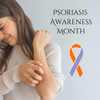
Understanding Psoriasis
, 3 min reading time

, 3 min reading time
August is Psoriasis Month! Let's learn a little about it, what causes it and what might help it! Understanding Psoriasis: Causes, Symptoms, and Treatment Options
August is Psoriasis Month! Let's learn a little about it, what causes it and what might help it!
Psoriasis is a chronic autoimmune skin condition that affects millions of people worldwide. Characterized by red, itchy patches of skin covered with silvery scales, psoriasis can vary in severity and impact individuals both physically and emotionally. In this blog post, we delve into the causes, symptoms, and treatment options available for managing this challenging condition.
The exact cause of psoriasis is not fully understood, but it is believed to result from an overactive immune system that triggers inflammation and accelerates the skin cell turnover process. Normally, skin cells mature and are shed from the skin's surface in about a month. In psoriasis, this process occurs much faster, leading to the buildup of skin cells and the characteristic plaques.
Genetics also play a significant role in psoriasis, as it tends to run in families. Certain genetic mutations can increase the likelihood of developing the condition when triggered by environmental factors such as stress, infections, or injuries to the skin.
Psoriasis can manifest in various forms, each with its own unique characteristics:
Plaque Psoriasis: The most common form, characterized by raised, red patches covered with silvery scales. These patches can appear anywhere on the body, including the scalp, elbows, knees, and lower back.
Guttate Psoriasis: Often triggered by a bacterial infection, this type presents as small, water-drop-shaped sores on the trunk, arms, legs, and scalp.
Inverse Psoriasis: Found in skin folds such as under the breasts, in the groin, or around the genitals, where it appears as smooth, red patches without scales.
Pustular Psoriasis: Characterized by white pustules surrounded by red skin, typically occurring on the hands or feet.
Erythrodermic Psoriasis: A rare but severe form that can cover the entire body with a red, peeling rash that can itch or burn intensely.
While there is no cure for psoriasis, various treatment options can help manage symptoms and improve quality of life.
Topical Treatments: Creams, ointments, and lotions containing corticosteroids, vitamin D analogs, retinoids, or salicylic acid can reduce inflammation, scaling, and itching.Psoriasis is more than a skin condition; it can impact emotional well-being and quality of life. Living with psoriasis involves not only managing physical symptoms but also addressing the psychological aspects of coping with a chronic condition. Support groups, counseling, and education about psoriasis can be valuable resources for individuals and their families.
Psoriasis is a complex autoimmune condition that requires ongoing management and care. Understanding its causes, recognizing its symptoms, and exploring the range of treatment options available are crucial steps in effectively managing psoriasis. If you suspect you have psoriasis or are experiencing symptoms, consult with a dermatologist or healthcare provider for an accurate diagnosis and personalized treatment plan. With proper management and support, individuals with psoriasis can lead fulfilling lives while effectively managing their symptoms and overall health.
*It is important to consult with a qualified healthcare professional or doctor before making any significant changes to your lifestyle, diet, exercise routine, or health regimen. The information provided in this blog post is intended for general informational purposes only and should not be construed as medical advice or a substitute for professional medical care. Every individual's health needs are unique, and a healthcare provider can provide personalized guidance based on your specific health status and medical history.


